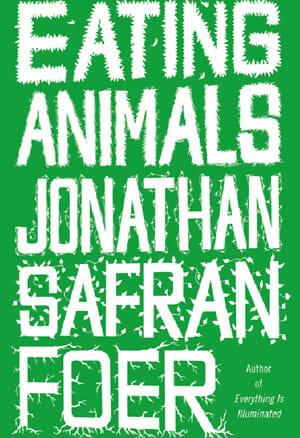Jonathan Safran Foer: Eating Animals

Jonathan Safran Foer’s novels are dense, energetic, concerned with all things moral and Jewish, pleased with themselves, sentimental, and too wordy for a lot of us. They are like wild Russian dances that leave you breathless and wondering why you stayed on the dance floor. Without argument, he is enormously talented and passionate, but his writing and gimmicks can get in the way of the material.
His first nonfiction book, Eating Animals, is both everything good and annoying about Foer’s fiction. It’s bursting with passion, facts, insight, sentimentality, overwrought pleas, and a deep conviction that it’s an important book. I underlined many gushy descriptions and self-righteous passages, but an equal number of times I was blown away.
I do not mean by this that I enjoyed the book. This is an exposé on the industrial factory farms that provide America with 99 percent of its meat and chicken, the barbarity of high-speed industrial slaughter, and the disgusting and unhealthy nature of factory-farmed meat—an argument for why no decent person, especially an environmentalist, should eat meat with a good conscience. Foer writes, “We know that if someone offers to show us a film on how our meat is produced, it would be a horror film.” He gives truly sickening descriptions of the suffering of factory-farmed animals, plus studies that prove eating meat is a dangerous risk to health. Oh, and he throws in childhood memories and mini-essays on seahorses and kosher foods.
Eating Animals makes a solid case for the absolute devastation meat production levels on the environment, and it’s a polemic for vegetarianism, undertaken by Foer when he became a father and faced deciding for his son whether they could eat the animals of their favorite nighttime stories and songs. It’s a weave of short chapters about his family, the earth, firsthand accounts of breaking into a factory chicken farm in the middle of the night, interviews with factory and family farmers, animal-rights people, slaughterers, scientists and experts on food-borne illness.
Many readers will find this book a serious buzz kill. I cannot think of a single friend to whom I might recommend it, even though they are all tenderhearted souls, passionate about the environment. They are also food lovers, and mostly great cooks, and they love their animal protein. Even so, the book is riveting, addictive, heartfelt and fair, with surprising humor. Sometimes it sounds like a screed, but so did Rachel Carson’s warnings to many people, and Al Gore’s. One has to earnestly care about saving the earth, whether or not one is moved by the suffering of, say, turkey chicks.
-

-

-

-

-

-

-

-

-

-

-

-

-

-

-

-

-

-

-

-

-

-

-

-

-

-

-

-

-

-

-

-

-

-

-

-

-

-

-

-








































